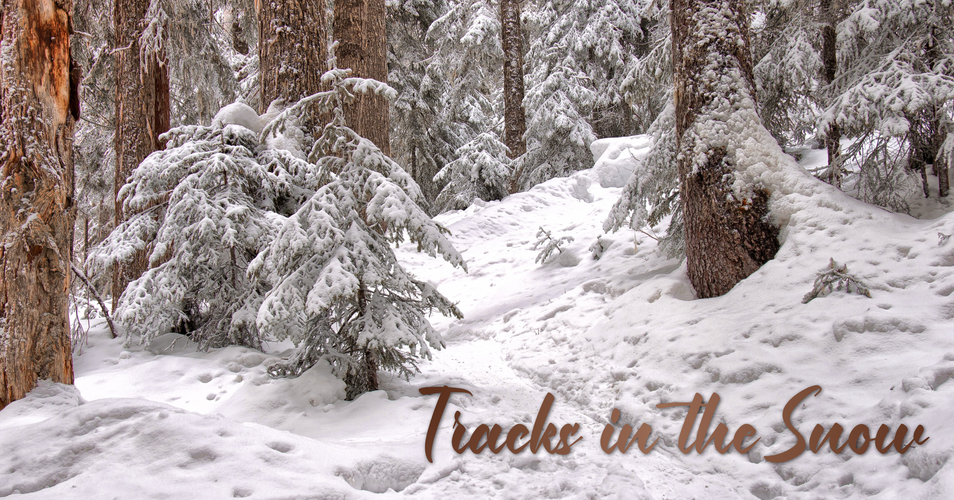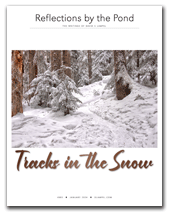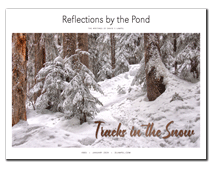But the day of the Lord will come like a thief, in which the heavens will pass away with a roar and the elements will be destroyed with intense heat, and the earth and its works will be found out. Since all these things are to be destroyed in this way, what sort of people ought you to be in holy conduct and godliness, looking for and hastening the coming of the day of God…
2 Peter 3:10–12
Traces Left Behind
They cross my path, heading west, north, east, or south, following off into the empty field or deep into the trees. Methodical indentations arranged in neat rows crisscross the heavier impressions I create in the fallen snow.
The deer have come through, following their customary path from deep woods, across the front field, around to the leavings from the bird feeder by the pond. The three-fingered turkeys and turkey buzzards have come by in their pecking column, nervous, scratching, turning off the road to roost in the trees. The smaller birds, too, have left their tracks: delicate, fidgety tracings barely more than whispers atop the snow.
The possums too have come this way in their squat waddle, pointed snout poking left and right, long rat tail dragging behind to dust their tracks. And the mice in their leaping vaults have crossed paths with the rest, tiny feet touching down then springing forward, headed for easier paths. And there, prancing down the middle of the drive, the farm dog from down the road has left his round-padded impressions, confidently going nowhere, as usual.
As I tramp out to the mailbox my heavy boots cross over them all, mixing in, obliterating, leaving others pristine in the frozen cover. Since my last passage it seems every creature in the woods has passed by, pausing to nibble or consider the terrain, but ultimately continuing on toward some private destination.
And now on the trip down the drive and then on the way back up, returning to the house, I leave my own tracks in the snow—the work-a-day pattern of my boot tread.
Ancient History
No one moves through life without leaving behind traces of their passing. Every person leaves tracks in the snow.
A few years back we attended a family wedding at which the sister of a sister-in-law was present. We had not been around each other for decades—last when I was either in my teens or earliest twenties. Even so, her reaction to me was immediate and pointed, remarking in unkind terms upon my less than stellar character. I was mystified. I hadn’t seen this woman in half a lifetime; what could she possibly have against me?
But I had left tracks in the snow. When last she had been around me I had been a snotty, untrustworthy, wise-cracking teenager—and, as such, I had made an impression of such profundity that it had stayed with her lo these many years.
A Small Fire
People know where we’ve been, and from our tracks they can usually figure out where we’re going. Beyond that, others know how we’ve made the passage. They’ve watched our steps, observed our behavior, and listened to the words that have passed our lips. Like it or not, we leave something behind.
What we say to others, what we say about others, what we say for others remains. Like television signals of old I Love Lucy and Gunsmoke episodes bouncing around the galaxy in perpetuity, what we say has an annoying habit of never going away entirely. People remember that we said something sharp and hurting. It colors for a very long time their perception of who we are, what we stand for, the make-up of our character. For them it is a picture-window into our soul, into what we believe and in what our hope is set.
So also the tongue is a small part of the body, and yet it boasts of great things. Behold how great a forest is set aflame by such a small fire! And the tongue is a fire, the very world of unrighteousness; the tongue is set among our members as that which defiles the entire body, and sets on fire the course of our existence, and is set on fire by hell… But no one can tame the tongue; it is a restless evil and full of deadly poison.
James 3:5–6, 8
Yet the same is true for those words of kindness and encouragement we have for others. Speak a timely, compassionate word and it will be remembered. Resist the opportunity to criticize, even when it may be warranted, and your kindness will be remembered. Be forgiving when the offender expects rebuke, and your grace will be remembered.
We all leave tracks in the snow.
A Life Well-spent
Bear one another’s burdens, and so fulfill the law of Christ.
Galatians 6:2
We live in the age of fully-digitalized, virtualized capacity, off-site voice mail, e-mail, and text messages—not to mention the ubiquitous, loathsome social media. We need never be more than a digital message away from anyone trying to make contact with us. All of this can now be contained in a feather-light, portable phone/camera/internet browser/ad nauseam that permits us to receive calls or messages no matter what the time, no matter where we are, no matter how busy we are with other responsibilities. It’s the latest thing. The very latest.
But in a time of grief, nothing is better than a neighbor for taking a call.
Today there are many details to dying, and the family is left to see to the arrangements for the funeral, the flowers, memorials, the will, and deciding what will be served at the post-burial luncheon. It all can become a bit much for those who simply want to sit and remember the good times shared with a loved one now gone.
So in a small Midwestern town, when the family needs to run errands, yet at the same time receive well-wishers, it is not voice mail, or a cell phone, or a machine, but a neighbor who stays behind to attend the home phone and doorbell. When friends and family call—either by phone or in person—it is not something digital that greets them, but a human being. It is warm, and real, and wildly inefficient. It is the face of God dwelling for awhile in a hurting home.
This is the very best way to love. Put your life on the line for your friends.
John 15:13 The Message
During the week of sorrow and thanksgiving surrounding the death of a family member years ago, the burden of sorrow was lightened by the tender ministrations of those who cared. They carried the person of Christ into our midst by their gentle help, their quiet patience, their willingness to set aside everything else to minister to friends.
The care center nurse tenderly kissing our loved one’s forehead in her dying moments; those who sat and quietly listened, or joined in our grief; those who prepared and delivered the meals which sustained us; those who thought less of their own time than their devotion to a friend—all made themselves available to a loving God who cares for His children through the hands of those nearby.
These dear ones left tracks in the snow. Their unselfish, kind actions left marks that will remain forever etched on our hearts.
Our generous and unledgered kindnesses are the traces we leave behind. They mark the chapters of our life, and they are the evidence for a life well-spent.
Issue #885 January 2024
Reflections by the Pond is published monthly at dlampel.com and is © 2024 David S. Lampel.
Unless otherwise indicated, all Scripture quotations taken from the (LSB®) Legacy Standard Bible®, Copyright © 2021 by The Lockman Foundation. Used by permission. All rights reserved. Managed in partnership with Three Sixteen Publishing Inc. LSBible.org and 316publishing.com. This and all of our resources are offered free-of-charge to the glory and praise of Christ our Lord. Cover photo by James Wheeler on Unsplash.



